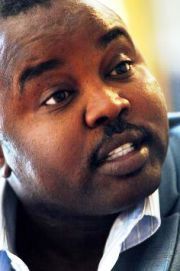SLM rebel leader says Doha talks aim to help Sudan’s embattled president
February 9, 2009 (PARIS) — A Darfur rebel leader rejected talks to be held in Doha between the Sudanese government and the Justice and Equality Movement (JEM), saying such a meeting means to stop the indictment of President Al-Bashir but not to end the conflict.

Abdel-Wahid Al-Nur, the rebel leader, said today that the Doha talks aim at suspending the indictment of President Omer Hassan Al-Bashir by International Criminal Court (ICC) and to stop the expected arrest warrant for him.
“We reject this round of talks because it means to press the UN Security Council to defer the indictment of Al-Bashir and rescue the embattled president who is accountable for genocide in Darfur,” Al Nur said.
The ICC judges are expected to issue in the coming days an arrest warrant for President Al-Bashir who is accused since mid July 2008 by the chief prosecutor of genocide, crimes against humanity and war crimes.
The African Union and the Arab League sent a new delegation to New York to request the UN Security Council to block Al-Bashir’s indictment. The law level delegation includes the Assistant Secretary General of the Arab League Ahmed bin Hali, the AU commissioner for peace and security and the Qatari envoy to the United Nations.
Another rebel group, SLM-Unity, in a letter sent to the UN Secretary General today rejected any regional or international interference to counter the indictment of the Sudanese president.
Likewise, the SLM-mainstream rebel leader, who had refused to approve a peace deal signed by Minni Minnawi in 2006 with the Sudanese government, criticized the Doha process as a remake of the Abuja peace deal which according to him has increased the suffering of Darfur people and “legalized the ongoing genocide.”
Al-Nur also said that this meeting comes in line with efforts to reunite the Sudanese Islamic movement. “This Doha meeting is held in the context of recent efforts to reunite the Sudanese Islamists after the indictment of the head of the regime,” he said.
JEM is often accused of being the military wing of the opposition Popular Congress Party led by Hassan Al-Turabi who was the éminence grise of the Sudanese Islamists up to 1999. However, though the JEM leader admits he had been part of the Islamist movement, he denies any relation with Al-Turabi party since the establishment of JEM.
The SLM founder said that no peace in Darfur can be reached with a regime that does not honor and implement the signed agreements. He also stressed the need for Khartoum to clear first the consequences of the six year conflict including the disarmament of militias and return of IDPs to their villages, adding “only after that peace talks should be dedicated to the root causes of the conflict.”
Al-Nur, who is largely supported by the IDPs in Darfur, had refused to sign the Abuja peace agreement because the agreement did not deal with the individual compensation of the IDPs and victims of the conflict. He also wanted the question of land ownership to be clearly settled in the deal, besides other political demands.
The Paris-based rebel leader vowed in the past he would not take part in any peace talks unless Khartoum enforces measures related to the protection of the civilians called “conflict suspension.”
(ST)
